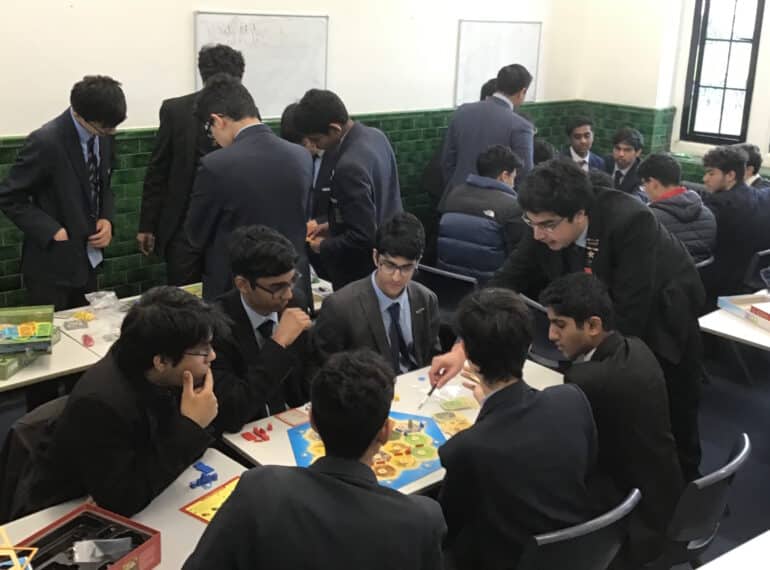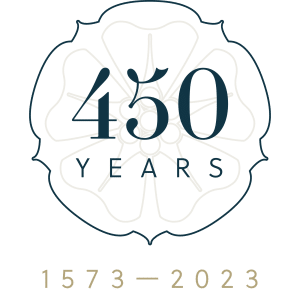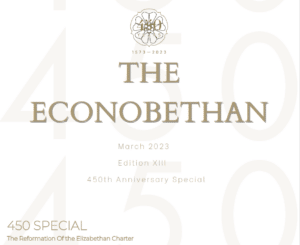
With events for all ages, QE’s Economics 450 Festival proved hugely popular with the boys.
 The festival featured academic tutorials and a lecture from Old Elizabethans, board games, a quiz, a meeting of QE’s Gresham Society for Economics and a special edition of the department’s periodical, The Econobethan.
The festival featured academic tutorials and a lecture from Old Elizabethans, board games, a quiz, a meeting of QE’s Gresham Society for Economics and a special edition of the department’s periodical, The Econobethan.
It was one of a series of innovative festivals being run by subject departments as part of QE’s new Flourish extra-curricular programme which are aimed at stimulating free-thinking scholarship among the boys. As QE celebrates its 450th anniversary, most have an anniversary theme.
 Head of Economics Shamendra Uduwawala said: “Our events had huge turnouts and the festival may be regarded as a great success. I am grateful to everyone who contributed. The boys enjoyed the board games, the quiz and our visiting speakers, while our senior students have once again raised the bar with the festival edition of The Econobethan, which includes some really spectacular work.”
Head of Economics Shamendra Uduwawala said: “Our events had huge turnouts and the festival may be regarded as a great success. I am grateful to everyone who contributed. The boys enjoyed the board games, the quiz and our visiting speakers, while our senior students have once again raised the bar with the festival edition of The Econobethan, which includes some really spectacular work.”
He also paid tribute to his Economics department colleagues, Krishna Shah, Celia Wallace, Abdoulaye Diallo and James Kane.
The festival’s biggest single event was the quiz for Years 7-11. Run in a similar style to the daily online Tradle Economics quiz, it involved boys answering questions delivered to their form groups as Microsoft Forms.
Staplyton, Underne and Harrisons’ tied for first place, with a score of 29, gaining them each 20 House points. Staplyton and Underne benefitted from particularly strong performances from Year 11, while Harrisons’ boys performed consistently across the year groups. The top form overall was 10H (Harrisons’), who scored 8 out of a possible 10 points.
 Another highlight was a talk by economist and academic Sandeep Mazumder (OE 1993–2000), who is Dean of Hankamer School of Business at Baylor University, Texas.
Another highlight was a talk by economist and academic Sandeep Mazumder (OE 1993–2000), who is Dean of Hankamer School of Business at Baylor University, Texas.
Fellow alumnus Alistair Law (OE 2013–2020), who is in his final year at the London School of Economics and Political Science (LSE), where he is reading Geography with Economics, held academic tutorials with a number of Year 12 and 13 economists.
The special session of the Gresham Society involved boys presenting articles they had written for The Econobethan PechaKucha-style – that is, 20 slides, with a maximum 20 seconds per slide.
The 450th anniversary edition of the publication itself includes articles on Economics and related subjects written by boys in Years 10 to 13, as well as an introduction by the Headmaster, Neil Enright.
 He wrote: “As my predecessor, Dr John Marincowitz (Headmaster 1999-2011), explained at this year’s Senior Awards Ceremony, when discussing his new published history of the School, the fortunes of the School have repeatedly been shaped by the political, economic and social context of the time. He emphasised that much of the interest in the development of Queen Elizabeth’s, and its multiple reinventions over the centuries, can be found in considering not just the ‘what’, but in the ‘how’ and the ‘why’.
He wrote: “As my predecessor, Dr John Marincowitz (Headmaster 1999-2011), explained at this year’s Senior Awards Ceremony, when discussing his new published history of the School, the fortunes of the School have repeatedly been shaped by the political, economic and social context of the time. He emphasised that much of the interest in the development of Queen Elizabeth’s, and its multiple reinventions over the centuries, can be found in considering not just the ‘what’, but in the ‘how’ and the ‘why’.
“These are questions and discussions that this special edition of The Econobethan takes up with great skill.”
Extending to 52 pages, the journal’s first article looks at the origins and political significance of the School’s Elizabethan Charter.
The widely varied contents also cover topics including:
- How the British Empire Used Economics to Rule the World: A Game Theoretic Analysis
- The History of Chemical Process Economics and Its Impact on the UK Economy
- What Happens When Central Banks Lose Credibility?
- Regal Ruler or Rigid System? The Pros and Cons of Monarchy Unveiled
- The Revolutionary Effectiveness of Nudge Economics
In addition, there is a Languages section, in which Year 12’s Aayush Backory gave an overview of post-World War II economic policy in Britain – Il était une fois au Royaume-Uni. In Die Geschichte von Sir Thomas Gresham, Aditya Tiwary looked at the life of the 16th-century financier and merchant, Sir Thomas Gresham, who was among the School’s supporters at its foundation in 1573. The Gresham Society is named after him.
The Econobethan was edited by the Year 12 team of Aditya, Aston Daniel, Avinash Srivastava and Nishanth Bhasuru.
